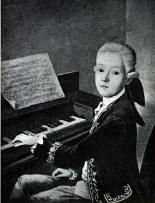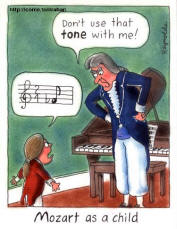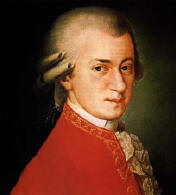Mozart
His Life
 Wolfgang Amadeus Mozart (1756-1791) was born in Salzburg, Austria into a musical family headed by his father, Leopold Mozart. Wolfgang was playing the piano at age three and was composing by age five. When he was six, his father took Wolfgang and his sister (who was a talented keyboard player) on a performing tour of the courts at Vienna and Munich. The next year they went on tour again, this time including two weeks at Versailles, where they enchanted the French king Louis XV. In 1764 the eight year old Mozart wrote his first three symphonies. The following years in young Mozart's life was filled with more touring and performing throughout Europe. When in Rome, Wolfgang heard a performance of the Opera 'Miserere' one time. Even though Mozart had not seen the musical score, he was able to write down the music almost perfectly from memory.
Wolfgang Amadeus Mozart (1756-1791) was born in Salzburg, Austria into a musical family headed by his father, Leopold Mozart. Wolfgang was playing the piano at age three and was composing by age five. When he was six, his father took Wolfgang and his sister (who was a talented keyboard player) on a performing tour of the courts at Vienna and Munich. The next year they went on tour again, this time including two weeks at Versailles, where they enchanted the French king Louis XV. In 1764 the eight year old Mozart wrote his first three symphonies. The following years in young Mozart's life was filled with more touring and performing throughout Europe. When in Rome, Wolfgang heard a performance of the Opera 'Miserere' one time. Even though Mozart had not seen the musical score, he was able to write down the music almost perfectly from memory.
On YouTube | Click here for closed captioned video | Click here if video above is blocked | transcript of video
In 1773 Wolfgang and his father went to Vienna, hoping to obtain a court appointment. Although no offer of work was presented, Mozart met Haydn and Haydn's work had a great influence on the young Mozart's work. By 1778, Mozart's life was not as pleasant as those of his childhood. His mother died in 1777, he had not found a job yet, and at age 22 he was no longer a child prodigy. Mozart moved back to Salzburg where he took a job as the church organist. While performing his duties as church organist, Mozart was also writing music - he wrote his 'Sinfonia Concertante' for violin, viola and orchestra in 1780, and he composed his first Opera and his famous 'Serenade for 13 wind instruments' in 1781. Wolfgang wasn't getting along with his boss, the archbishop of Salzburg. He was fired in 1781 and had to be physically ejected from the archbishop's residence.
On YouTube | Click here for closed captioned video Click here if video above is blocked | transcript of video
In 1781 Mozart moved to Vienna. At first, life was good - his Opera "The Abduction from the Seraglio" was a huge success; he was able to pick which students he would teach; he sold tickets to his concerts of keyboard compositions and improvisations. This continued for four or five seasons, but then the public started to forget him. Pupils found other teachers, commissions dropped off, family expenses started to mount; his health declined, and no permanent work was to be found. Strangely, most of Mozart's most famous works came from this depressing time of his life. He was deeply in debt when in July of 1791 he was commissioned to compose a Requiem Mass (Mass of the dead). Mozart never learned who the music was for (it turned out to be Count Walsegg, who planned to tell everyone that he was the composer). Mozart grew ill - his wife asked Wolfgang's students to help finish the work. The Requiem was unfinished when Mozart died on December 5, 1791 - his burial the next day was attended only by the gravedigger.
On YouTube | Click here for closed captioned video | Click here if the video above is blocked | transcript of video
His Music
Mozart did not have to struggle with composing. He had been well trained musically as a child and he learned instantaneously from exposure to any new musical ideas and styles. Where many composers work and struggle to find inspiration, Mozart always seemed to have melodies and music at his call. He would work out this music (often very complex music) in his head down to the last detail. Writing it down was just a matter of writing down what was already finished. Mozart could laugh, joke and carry on a conversation while 'composing'. Like most composers of the time, Mozart rarely wrote music 'just because' - there was usually a performer or performance that the piece was intended for. Weddings, birthday parties, dances; Mozart wrote music for particular occasions, but because of the beauty these pieces have survived. One interesting exception to this rule was his Coronation Mass composed in 1779 - Mozart was not commissioned to write this piece, it apparently was written to satisfy an inner need.
Mozart was influenced by the work of musicians before him, most notably Haydn and J.S. Bach. In 1785 Wolfgang published 6 string quartets dedicated to Haydn, but Mozart did not imitate the style of Haydn, he improved upon it. The scores of these songs are some of the few that show large numbers of corrections and revisions - Mozart worked hard to get them just right. In Mozart's later works one can see the influence of J.S. Bach in the contrapuntal textures that he started to use, and in the serious moods found in his later vocal pieces. Mozart also arranged several of Bach's fugues for strings.
Mozart wrote 41 Symphonies, and many are standard repertoire for orchestras today. His last three symphonies (Symphony in Eb, G minor and C major [called the Jupiter]) were among his greatest; the 3 show how Mozart could express all emotions. The Symphony in Eb is cheerful and graceful, G minor is sad, and the Jupiter Symphony is an expression of victory and strength. Mozart wrote 27 string quartets, two dozen piano concertos as well as concertos for other solo instruments as well.
 Mozart - Eine kleine Nachtmusik- Allegro
Mozart - Eine kleine Nachtmusik- Allegro
 Mozart - Symphony in C Major (The Jupiter Symphony) - IV Molto Allegro
Mozart - Symphony in C Major (The Jupiter Symphony) - IV Molto Allegro
 Mozart - Piano Concerto No. 23 in A major - III. Allegro assai
Mozart - Piano Concerto No. 23 in A major - III. Allegro assai
Mozart wrote several Operas. Probably the most famous are: "The Marriage of Figaro", "Don Giovanni" and "The Magic Flute". Figaro is the epitome of eighteenth century Italian comic opera, Don Giovanni is a dramatical opera based on the the medieval legend of Don Juan, and the Magic Flute is a fable associated with Freemason symbolism.
 Mozart - The Marriage of Figaro - Overture
Mozart - The Marriage of Figaro - Overture
 Mozart - Don Giovanni - Don Giovanni
Mozart - Don Giovanni - Don Giovanni
 Mozart - Requiem Mass - Lacrimosa
Mozart - Requiem Mass - Lacrimosa
|
Assignment #3 - Name that Tune Part Duex
You will need to identify music presented in this Unit. This is a matching test - you will need to match a sample of music to the name &/or composer.
Music in the quiz will be selected from this list:
|
Assignment #4 - Unit 6 Quiz
This is a quiz over the material presented in this Unit. |
 Wolfgang Amadeus Mozart (1756-1791) was born in Salzburg, Austria into a musical family headed by his father, Leopold Mozart. Wolfgang was playing the piano at age three and was composing by age five. When he was six, his father took Wolfgang and his sister (who was a talented keyboard player) on a performing tour of the courts at Vienna and Munich. The next year they went on tour again, this time including two weeks at Versailles, where they enchanted the French king Louis XV. In 1764 the eight year old Mozart wrote his first three symphonies. The following years in young Mozart's life was filled with more touring and performing throughout Europe. When in Rome, Wolfgang heard a performance of the Opera 'Miserere' one time. Even though Mozart had not seen the musical score, he was able to write down the music almost perfectly from memory.
Wolfgang Amadeus Mozart (1756-1791) was born in Salzburg, Austria into a musical family headed by his father, Leopold Mozart. Wolfgang was playing the piano at age three and was composing by age five. When he was six, his father took Wolfgang and his sister (who was a talented keyboard player) on a performing tour of the courts at Vienna and Munich. The next year they went on tour again, this time including two weeks at Versailles, where they enchanted the French king Louis XV. In 1764 the eight year old Mozart wrote his first three symphonies. The following years in young Mozart's life was filled with more touring and performing throughout Europe. When in Rome, Wolfgang heard a performance of the Opera 'Miserere' one time. Even though Mozart had not seen the musical score, he was able to write down the music almost perfectly from memory.
